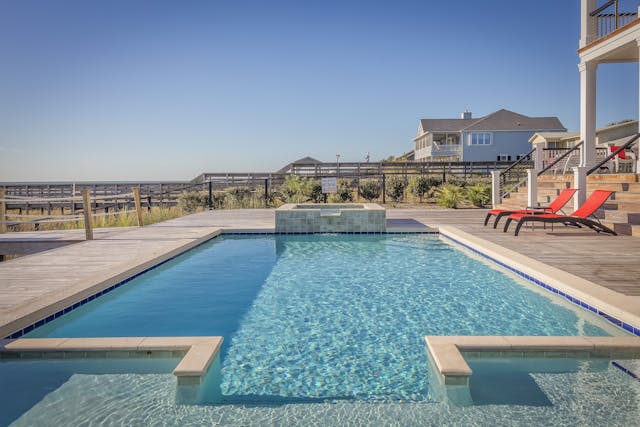Adding a pool to your property is an exciting project. It can transform your backyard into a private oasis, provide a space for family fun, and even increase your home’s value. However, this is not a decision to make on impulse. Proper planning ensures the investment aligns with your lifestyle, budget, and property. Before taking the plunge, let’s dive into the essential factors every homeowner should consider.

Assessing Your Property
Your property is the foundation of your pool project—literally. Begin by evaluating the available space. A pool should fit comfortably without crowding other essential outdoor areas. Examine the landscape to ensure it’s suitable for excavation and consider any slopes or uneven terrain that may require additional work.
Additionally, research zoning regulations and property line restrictions in your area. Many municipalities have specific rules about where a pool can be placed. Remember to account for sunlight exposure. A pool shaded by trees might stay calm, but falling leaves can lead to frequent cleaning. The proper placement will save you time and effort in the long run.
Determining the Purpose of Your Pool
Before deciding on a pool, think about why you want one. Will it primarily be a recreational space for children? Are you envisioning a serene spot to unwind after a long day? Or are you seeking a pool for fitness purposes?
Clearly defining the pool’s purpose helps guide your choices in size, depth, and additional features. For instance, a family-friendly pool may include a shallow area, while a fitness-focused pool might prioritize length. Aligning the design with your goals ensures the pool meets your needs for years.
Budget and Long-Term Costs
Installing a pool is a significant financial commitment. In addition to the initial installation costs, such as excavation, materials, and permits, you’ll also face ongoing expenses. Maintenance, utility bills, and potential repairs can add up quickly.
Consider your financing options carefully. Some homeowners choose to save up, while others explore financing plans. Take time to research the costs of materials and equipment. A concrete pool may last longer but is cheaper than a vinyl-lined option. Planning for both upfront and long-term expenses will help you avoid unexpected financial stress.
Safety and Legal Considerations
Safety should always be a top priority when installing a pool. Many regions require fencing, covers, or alarms to prevent accidents. Familiarize yourself with local laws to ensure your pool complies with these regulations.
In addition to physical barriers, consider liability coverage in your homeowner’s insurance policy. An attractive pool can also attract risks, so reviewing your coverage and adjusting as needed is wise. Being proactive about safety protects your loved ones and your financial investment.
Design and Aesthetic Choices
A pool is more than a functional addition—it’s also a visual centerpiece. Choose a design that complements your home’s architecture and landscaping. The options are endless, whether you prefer a sleek, modern infinity pool or a traditional kidney shape.
Add features that enhance both aesthetics and usability. Waterfalls, lighting, or built-in seating can elevate the overall experience. However, prioritize durability and functionality. A beautiful pool won’t feel as enjoyable if it constantly needs repairs.
Understanding Pool Technology
Modern pools are as much about technology as they are about design. Innovative pool systems allow homeowners to control lighting, temperature, and cleaning schedules through a mobile app. These systems simplify pool management, ensuring optimal performance while saving time.
Advanced filtration and circulation systems can improve water quality and reduce maintenance needs. Additionally, consider options like automated chemical dispensers or UV water treatment to keep your pool clean and safe with minimal effort. Investing in the right technology can enhance your pool experience and ensure it’s equipped for the future.
Partnering with Professional Builders
Hiring a swimming pool builder is one of the most intelligent decisions. These professionals bring expertise to every project stage, from designing the layout to obtaining necessary permits. A skilled builder will guide you through material options, construction timelines, and any challenges that may arise.
To find a reputable contractor, look for online reviews, ask for referrals, and verify licenses. Meet with a few candidates to discuss your vision and get estimates. Partnering with the right team ensures your pool is beautiful and built to last.
Maintenance Planning
A pool requires regular upkeep to stay safe and inviting. Maintenance tasks include cleaning, water testing, and equipment checks. While you can handle some of these, you may hire a professional service for more thorough care.
Consider investing in automated systems like robotic cleaners or smart pool monitors. These tools can simplify upkeep and give you more time to enjoy your pool. Planning for maintenance beforehand helps set realistic expectations for the commitment involved.
Environmental Impact and Sustainability
Pools can be resource-intensive, but there are ways to reduce their environmental impact. Opt for energy-efficient pumps and solar heating systems to lower energy consumption. Consider installing a water-saving design, such as a pool cover, to reduce evaporation.
Using sustainable materials in construction also minimizes your pool’s ecological footprint. Making eco-conscious choices benefits the planet and can lead to long-term savings.
Conclusion
Adding a pool is an exciting opportunity to enhance your home and lifestyle, but it requires careful thought and preparation. Every detail matters, from property assessments and budget planning to design and maintenance. Partnering with professional builders and incorporating modern technology can simplify the process and ensure a high-quality result. Considering these considerations, you’ll create a pool that adds value and enjoyment to your home for years.
















Add Your Comment